学会质疑作文【高中高二900字】
- 格式:docx
- 大小:18.97 KB
- 文档页数:2
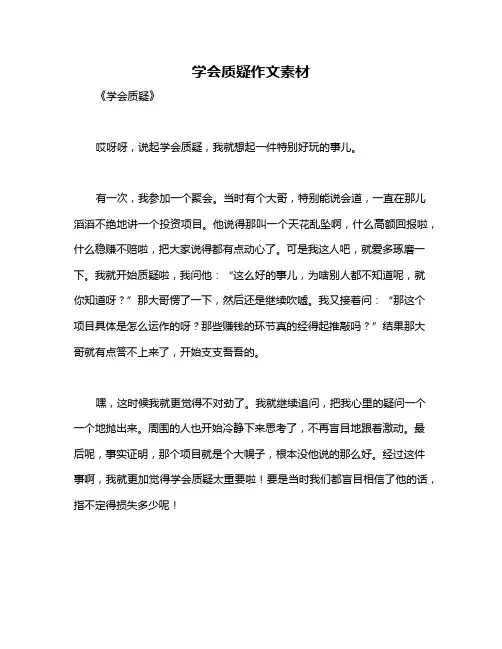
学会质疑作文素材
《学会质疑》
哎呀呀,说起学会质疑,我就想起一件特别好玩的事儿。
有一次,我参加一个聚会。
当时有个大哥,特别能说会道,一直在那儿滔滔不绝地讲一个投资项目。
他说得那叫一个天花乱坠啊,什么高额回报啦,什么稳赚不赔啦,把大家说得都有点动心了。
可是我这人吧,就爱多琢磨一下。
我就开始质疑啦,我问他:“这么好的事儿,为啥别人都不知道呢,就你知道呀?”那大哥愣了一下,然后还是继续吹嘘。
我又接着问:“那这个项目具体是怎么运作的呀?那些赚钱的环节真的经得起推敲吗?”结果那大哥就有点答不上来了,开始支支吾吾的。
嘿,这时候我就更觉得不对劲了。
我就继续追问,把我心里的疑问一个一个地抛出来。
周围的人也开始冷静下来思考了,不再盲目地跟着激动。
最后呢,事实证明,那个项目就是个大幌子,根本没他说的那么好。
经过这件事啊,我就更加觉得学会质疑太重要啦!要是当时我们都盲目相信了他的话,指不定得损失多少呢!
所以呀,咱可得学会质疑,别听风就是雨,多问几个为什么,这样才能避免被那些不靠谱的东西给忽悠喽!只有学会质疑,咱才能在生活中更加清醒,更加明智呀!。
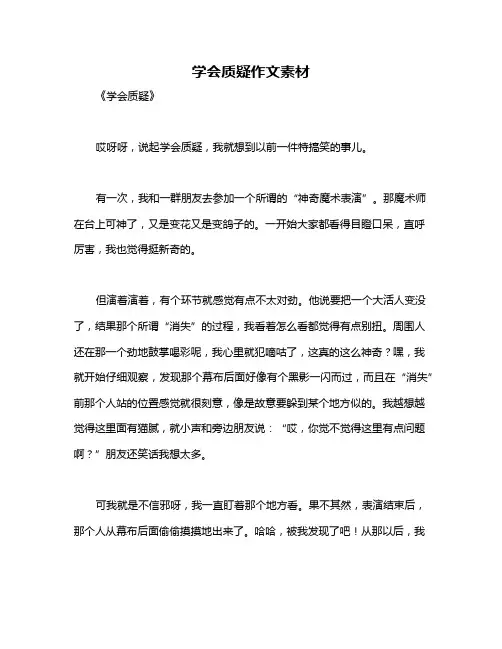
学会质疑作文素材
《学会质疑》
哎呀呀,说起学会质疑,我就想到以前一件特搞笑的事儿。
有一次,我和一群朋友去参加一个所谓的“神奇魔术表演”。
那魔术师在台上可神了,又是变花又是变鸽子的。
一开始大家都看得目瞪口呆,直呼厉害,我也觉得挺新奇的。
但演着演着,有个环节就感觉有点不太对劲。
他说要把一个大活人变没了,结果那个所谓“消失”的过程,我看着怎么看都觉得有点别扭。
周围人还在那一个劲地鼓掌喝彩呢,我心里就犯嘀咕了,这真的这么神奇?嘿,我就开始仔细观察,发现那个幕布后面好像有个黑影一闪而过,而且在“消失”前那个人站的位置感觉就很刻意,像是故意要躲到某个地方似的。
我越想越觉得这里面有猫腻,就小声和旁边朋友说:“哎,你觉不觉得这里有点问题啊?”朋友还笑话我想太多。
可我就是不信邪呀,我一直盯着那个地方看。
果不其然,表演结束后,那个人从幕布后面偷偷摸摸地出来了。
哈哈,被我发现了吧!从那以后,我
就觉得呀,很多事情不能光听别人说或者表面上看到的就盲目相信,得学会质疑,多观察观察,说不定就能发现一些被忽略的小细节呢。
所以说啊,学会质疑真的很重要呢,能让我们不那么容易被忽悠,能看到事情更真实的一面哟!这可不是我瞎咧咧,那可是我的亲身经历告诉我的真理呀。
以上就是我写的一篇作文啦,你看看还行不?。
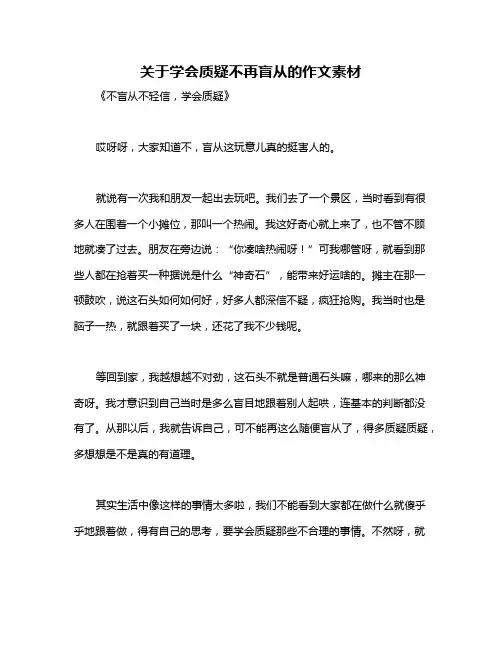
关于学会质疑不再盲从的作文素材
《不盲从不轻信,学会质疑》
哎呀呀,大家知道不,盲从这玩意儿真的挺害人的。
就说有一次我和朋友一起出去玩吧。
我们去了一个景区,当时看到有很多人在围着一个小摊位,那叫一个热闹。
我这好奇心就上来了,也不管不顾地就凑了过去。
朋友在旁边说:“你凑啥热闹呀!”可我哪管呀,就看到那些人都在抢着买一种据说是什么“神奇石”,能带来好运啥的。
摊主在那一顿鼓吹,说这石头如何如何好,好多人都深信不疑,疯狂抢购。
我当时也是脑子一热,就跟着买了一块,还花了我不少钱呢。
等回到家,我越想越不对劲,这石头不就是普通石头嘛,哪来的那么神奇呀。
我才意识到自己当时是多么盲目地跟着别人起哄,连基本的判断都没有了。
从那以后,我就告诉自己,可不能再这么随便盲从了,得多质疑质疑,多想想是不是真的有道理。
其实生活中像这样的事情太多啦,我们不能看到大家都在做什么就傻乎乎地跟着做,得有自己的思考,要学会质疑那些不合理的事情。
不然呀,就
会像我那次一样,花了冤枉钱还闹笑话嘞。
所以呀,咱们都得长点心,别再轻易盲从啦,这样才能在生活中少走些弯路,做出更明智的选择呀。
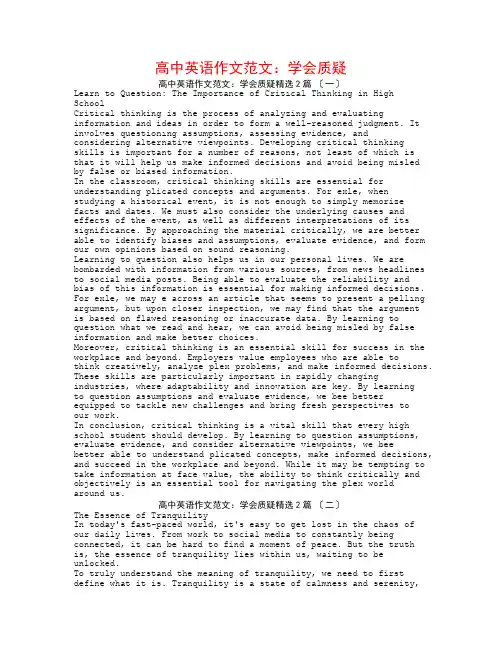
高中英语作文范文:学会质疑高中英语作文范文:学会质疑精选2篇〔一〕Learn to Question: The Importance of Critical Thinking in HighSchoolCritical thinking is the process of analyzing and evaluatinginformation and ideas in order to form a well-reasoned judgment. It involves questioning assumptions, assessing evidence, andconsidering alternative viewpoints. Developing critical thinkingskills is important for a number of reasons, not least of which isthat it will help us make informed decisions and avoid being misledby false or biased information.In the classroom, critical thinking skills are essential for understanding plicated concepts and arguments. For exle, whenstudying a historical event, it is not enough to simply memorizefacts and dates. We must also consider the underlying causes and effects of the event, as well as different interpretations of its significance. By approaching the material critically, we are better able to identify biases and assumptions, evaluate evidence, and form our own opinions based on sound reasoning.Learning to question also helps us in our personal lives. We are bombarded with information from various sources, from news headlines to social media posts. Being able to evaluate the reliability andbias of this information is essential for making informed decisions. For exle, we may e across an article that seems to present a pelling argument, but upon closer inspection, we may find that the argumentis based on flawed reasoning or inaccurate data. By learning to question what we read and hear, we can avoid being misled by false information and make better choices.Moreover, critical thinking is an essential skill for success in the workplace and beyond. Employers value employees who are able tothink creatively, analyze plex problems, and make informed decisions. These skills are particularly important in rapidly changingindustries, where adaptability and innovation are key. By learningto question assumptions and evaluate evidence, we bee betterequipped to tackle new challenges and bring fresh perspectives toour work.In conclusion, critical thinking is a vital skill that every high school student should develop. By learning to question assumptions, evaluate evidence, and consider alternative viewpoints, we beebetter able to understand plicated concepts, make informed decisions, and succeed in the workplace and beyond. While it may be tempting to take information at face value, the ability to think critically and objectively is an essential tool for navigating the plex worldaround us.高中英语作文范文:学会质疑精选2篇〔二〕The Essence of TranquilityIn today's fast-paced world, it's easy to get lost in the chaos ofour daily lives. From work to social media to constantly being connected, it can be hard to find a moment of peace. But the truthis, the essence of tranquility lies within us, waiting to beunlocked.To truly understand the meaning of tranquility, we need to firstdefine what it is. Tranquility is a state of calmness and serenity,free from disturbance or agitation. It's a feeling of inner peace that allows us to be present in the moment and appreciate the beauty of our surroundings. It's a way of being mindful and attuned to ourselves and the world around us.There are many ways to cultivate tranquility in our lives. One wayis to practice mindfulness meditation, which involves focusing our attention on the present moment without judgment. Through this practice, we can learn to let go of negative thoughts and feelings and bee more aware of our senses and surroundings.Yet another way to cultivate tranquility is to simplify our lives. We live in a culture that values busyness and productivity, but sometimes the best thing we can do for ourselves is to slow down and simplify. This might mean decluttering our homes, saying no to mitments that drain our energy, or simply taking a break from technology.Ultimately, the essence of tranquility is about finding balance in our lives. It's about recognizing when we need to slow down, take a step back, and connect with ourselves and the world around us. It's about prioritizing our well-being and making room for moments ofrest and reflection.。
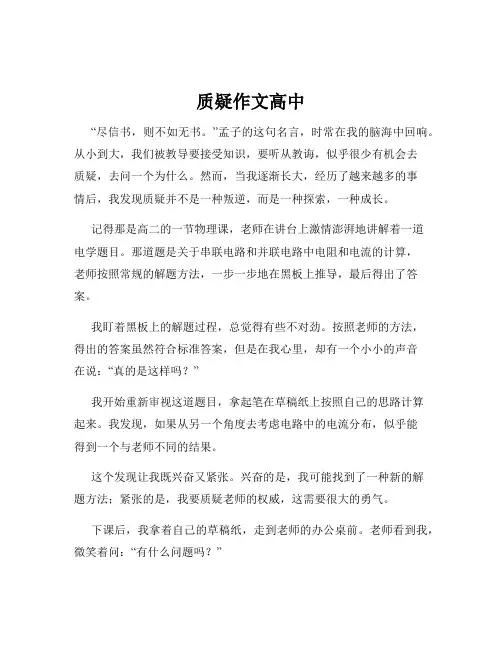
质疑作文高中“尽信书,则不如无书。
”孟子的这句名言,时常在我的脑海中回响。
从小到大,我们被教导要接受知识,要听从教诲,似乎很少有机会去质疑,去问一个为什么。
然而,当我逐渐长大,经历了越来越多的事情后,我发现质疑并不是一种叛逆,而是一种探索,一种成长。
记得那是高二的一节物理课,老师在讲台上激情澎湃地讲解着一道电学题目。
那道题是关于串联电路和并联电路中电阻和电流的计算,老师按照常规的解题方法,一步一步地在黑板上推导,最后得出了答案。
我盯着黑板上的解题过程,总觉得有些不对劲。
按照老师的方法,得出的答案虽然符合标准答案,但是在我心里,却有一个小小的声音在说:“真的是这样吗?”我开始重新审视这道题目,拿起笔在草稿纸上按照自己的思路计算起来。
我发现,如果从另一个角度去考虑电路中的电流分布,似乎能得到一个与老师不同的结果。
这个发现让我既兴奋又紧张。
兴奋的是,我可能找到了一种新的解题方法;紧张的是,我要质疑老师的权威,这需要很大的勇气。
下课后,我拿着自己的草稿纸,走到老师的办公桌前。
老师看到我,微笑着问:“有什么问题吗?”我深吸一口气,鼓起勇气说:“老师,刚刚那道电学题,我觉得还有另外一种解法。
”老师有些惊讶,但还是鼓励我讲下去。
我把自己的思路和计算过程详细地给老师讲解了一遍。
在讲解的过程中,我的手心里全是汗,心里不停地打鼓,害怕老师会否定我。
老师认真地听着,眉头时而紧皱,时而舒展。
等我讲完,老师沉默了一会儿,然后开始重新审视我的解法。
过了一会儿,老师抬起头,眼中露出赞赏的神色,说:“你的解法很新颖,也很正确。
是老师疏忽了,没有考虑到这种情况。
”听到老师的肯定,我心里的一块大石头终于落了地,那种喜悦和成就感简直无法用言语来形容。
这件事情让我明白了,质疑并不是对权威的挑战,而是对真理的追求。
如果我们只是一味地接受,而不去思考,不去质疑,那么我们永远也无法真正理解知识的内涵。
从那以后,我不再害怕质疑。
在课堂上,当我对某个知识点有疑问时,我会大胆地提出来;在生活中,当我对一些现象感到困惑时,我会努力去寻找答案。
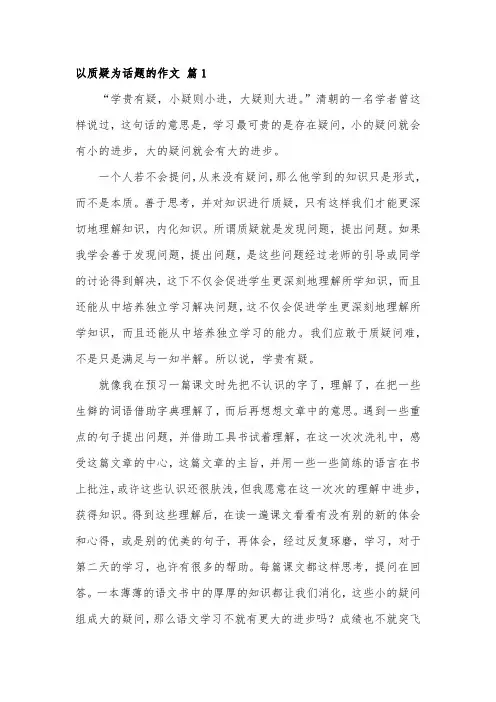
以质疑为话题的作文篇1“学贵有疑,小疑则小进,大疑则大进。
”清朝的一名学者曾这样说过,这句话的意思是,学习最可贵的是存在疑问,小的疑问就会有小的进步,大的疑问就会有大的进步。
一个人若不会提问,从来没有疑问,那么他学到的知识只是形式,而不是本质。
善于思考,并对知识进行质疑,只有这样我们才能更深切地理解知识,内化知识。
所谓质疑就是发现问题,提出问题。
如果我学会善于发现问题,提出问题,是这些问题经过老师的引导或同学的讨论得到解决,这下不仅会促进学生更深刻地理解所学知识,而且还能从中培养独立学习解决问题,这不仅会促进学生更深刻地理解所学知识,而且还能从中培养独立学习的能力。
我们应敢于质疑问难,不是只是满足与一知半解。
所以说,学贵有疑。
就像我在预习一篇课文时先把不认识的字了,理解了,在把一些生僻的词语借助字典理解了,而后再想想文章中的意思。
遇到一些重点的句子提出问题,并借助工具书试着理解,在这一次次洗礼中,感受这篇文章的中心,这篇文章的主旨,并用一些一些简练的语言在书上批注,或许这些认识还很肤浅,但我愿意在这一次次的理解中进步,获得知识。
得到这些理解后,在读一遍课文看看有没有别的新的体会和心得,或是别的优美的句子,再体会,经过反复琢磨,学习,对于第二天的学习,也许有很多的帮助。
每篇课文都这样思考,提问在回答。
一本薄薄的语文书中的厚厚的知识都让我们消化,这些小的疑问组成大的疑问,那么语文学习不就有更大的进步吗?成绩也不就突飞猛进吗?所以说:“小疑则小进,大疑则大进。
”敢于质疑,让我们由困惑,走向真知;敢于质疑,让我们由肤浅的知识走向深邃的大道理;敢于质疑,我们才会疑问解决中体会学习成功的快乐。
以质疑为话题的作文篇2人生往往面临着质疑,可怕的不是不敢面对,而是无限的自责与逃避,去聆听无声的质疑,面对不休的指责。
厩忆又拉扯到那天。
刚过夏季的清晨,风不断的呼啸。
我和同学一起骑车去上学,冷风让我不断的打哆嗦,骑到一段下坡路时,我们不断的加速,就在这时,几位年过半百的老人家,隔着大街谈论着家庭琐事,一位老人把手向空中一伸,正好将我和同学打下车,她也摇摇晃晃的倒了下去,立即人群像饿狼扑食般的拥了过来,将我们包围得里三层外三层,刚刚聊天的几位老人也合力把倒下的老人挽起,询问情况。
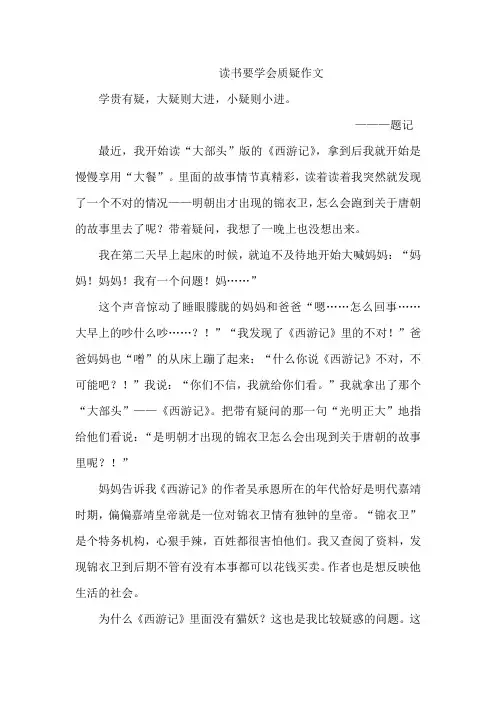
读书要学会质疑作文学贵有疑,大疑则大进,小疑则小进。
———题记最近,我开始读“大部头”版的《西游记》,拿到后我就开始是慢慢享用“大餐”。
里面的故事情节真精彩,读着读着我突然就发现了一个不对的情况——明朝出才出现的锦衣卫,怎么会跑到关于唐朝的故事里去了呢?带着疑问,我想了一晚上也没想出来。
我在第二天早上起床的时候,就迫不及待地开始大喊妈妈:“妈妈!妈妈!我有一个问题!妈……”这个声音惊动了睡眼朦胧的妈妈和爸爸“嗯……怎么回事……大早上的吵什么吵……?!”“我发现了《《西游记》里的不对!”爸爸妈妈也“噌”的从床上蹦了起来:“什么你说《《西游记》不对,不可能吧?!”我说:“你们不信,我就给你们看。
”我就拿出了那个“大部头”——《西游记》。
把带有疑问的那一句“光明正大”地指给他们看说:“是明朝才出现的锦衣卫怎么会出现到关于唐朝的故事里呢?!”妈妈告诉我《《西游记》的作者吴承恩所在的年代恰好是明代嘉靖时期,偏偏嘉靖皇帝就是一位对锦衣卫情有独钟的皇帝。
“锦衣卫”是个特务机构,心狠手辣,百姓都很害怕他们。
我又查阅了资料,发现锦衣卫到后期不管有没有本事都可以花钱买卖。
作者也是想反映他生活的社会。
为什么《《西游记》里面没有猫妖?这也是我比较疑惑的问题。
这个问题也难道了妈妈。
我查阅资料又有了新发现,原来还是由于嘉定皇帝特别喜欢猫,然后如果里面写到猫妖的话,可能会得罪了皇帝,小命不保吧!原来这些还是故事背后的故事呢。
在《《西游记》中还有许多的疑问,等着我们去发掘。
比如说为什么妖精都要吃唐僧肉?……真是让我越读越有趣。
妈妈告诉我说:读书学习不懂就要问,这样才能有进步,真是有道理!我也饶有兴致地继续阅读,继续找“茬”!。
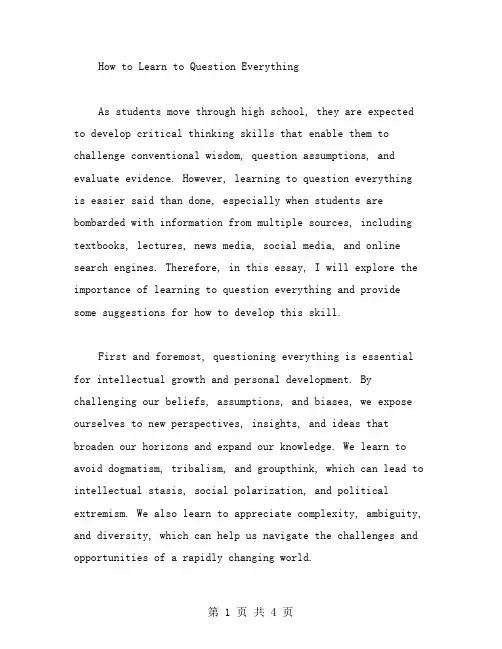
How to Learn to Question EverythingAs students move through high school, they are expected to develop critical thinking skills that enable them to challenge conventional wisdom, question assumptions, and evaluate evidence. However, learning to question everything is easier said than done, especially when students are bombarded with information from multiple sources, including textbooks, lectures, news media, social media, and online search engines. Therefore, in this essay, I will explore the importance of learning to question everything and provide some suggestions for how to develop this skill.First and foremost, questioning everything is essential for intellectual growth and personal development. By challenging our beliefs, assumptions, and biases, we expose ourselves to new perspectives, insights, and ideas that broaden our horizons and expand our knowledge. We learn to avoid dogmatism, tribalism, and groupthink, which can lead to intellectual stasis, social polarization, and political extremism. We also learn to appreciate complexity, ambiguity, and diversity, which can help us navigate the challenges and opportunities of a rapidly changing world.Secondly, questioning everything is crucial for academic success and professional achievement. In high school,students are expected to engage in critical reading, writing, and thinking, which involves evaluating arguments, analyzing evidence, and synthesizing information from multiple sources. By learning to question everything, students can developtheir analytical skills, research skills, and communication skills, which are essential for college readiness and career readiness. They can also become more independent, self-directed learners who can take ownership of their ownlearning and pursue their own interests and goals.Thirdly, questioning everything is essential for civic engagement and social responsibility. In a democratic society, citizens are expected to participate in public discourse, engage in political debates, and make informed decisions that affect their lives and the lives of others. By learning to question everything, students can become more informed, engaged, and responsible citizens who can contribute to the common good and promote social justice. They can also develop empathy, respect, and tolerance for others, which can help them build relationships, resolve conflicts, and promote diversity.Now that we have established the importance of learningto question everything, let us look at some strategies for developing this skill. Here are some suggestions:1. Start with yourself. Begin by questioning your own assumptions, biases, and expectations. Ask yourself why you believe what you believe, what evidence supports your beliefs, and what evidence challenges your beliefs. Be open-minded, humble, and curious.2. Read widely and critically. Read books, articles, and essays from multiple perspectives, including those that challenge your beliefs, values, and identity. Analyze arguments, evidence, and underlying assumptions. Look for patterns, contradictions, and gaps. Compare and contrast different sources.3. Participate in class discussions. Engage in respectful, thoughtful, and constructive debates with your peers and teachers. Listen carefully, ask questions, and respond thoughtfully. Avoid personal attacks, insults, and stereotypes. Be willing to change your mind if you are convinced by evidence and reasoning.4. Explore different media. Expose yourself to different types of media, including print, audio, video, and online. Be critical of the sources, motivations, and biases of eachmedia outlet. Check facts, verify sources, and evaluate the credibility of the information. Don't rely on a single source.5. Seek feedback and criticism. Ask for feedback and criticism from your teachers, peers, and mentors. Be open to constructive criticism, even if it is uncomfortable or challenging. Use feedback to improve your thinking, writing, and communication skills.In conclusion, learning to question everything is an essential skill for high school students who want to succeed academically, professionally, civically, and personally. By developing critical thinking skills, open-mindedness, and curiosity, students can expand their knowledge, broaden their horizons, and promote social justice. Therefore, let us encourage and support our students in learning to question everything.。
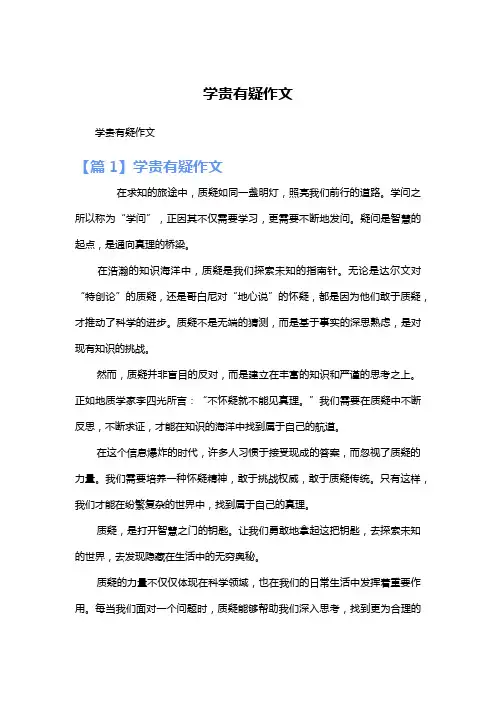
学贵有疑作文学贵有疑作文【篇1】学贵有疑作文在求知的旅途中,质疑如同一盏明灯,照亮我们前行的道路。
学问之所以称为“学问”,正因其不仅需要学习,更需要不断地发问。
疑问是智慧的起点,是通向真理的桥梁。
在浩瀚的知识海洋中,质疑是我们探索未知的指南针。
无论是达尔文对“特创论”的质疑,还是哥白尼对“地心说”的怀疑,都是因为他们敢于质疑,才推动了科学的进步。
质疑不是无端的猜测,而是基于事实的深思熟虑,是对现有知识的挑战。
然而,质疑并非盲目的反对,而是建立在丰富的知识和严谨的思考之上。
正如地质学家李四光所言:“不怀疑就不能见真理。
”我们需要在质疑中不断反思,不断求证,才能在知识的海洋中找到属于自己的航道。
在这个信息爆炸的时代,许多人习惯于接受现成的答案,而忽视了质疑的力量。
我们需要培养一种怀疑精神,敢于挑战权威,敢于质疑传统。
只有这样,我们才能在纷繁复杂的世界中,找到属于自己的真理。
质疑,是打开智慧之门的钥匙。
让我们勇敢地拿起这把钥匙,去探索未知的世界,去发现隐藏在生活中的无穷奥秘。
质疑的力量不仅仅体现在科学领域,也在我们的日常生活中发挥着重要作用。
每当我们面对一个问题时,质疑能够帮助我们深入思考,找到更为合理的解决方案。
比如,在工作中,我们常常会遇到一些看似理所当然的流程或规则,但如果我们能够勇敢地提出疑问,或许就能发现其中的不足,从而推动改进和创新。
此外,质疑还能够帮助我们更好地理解他人。
在与人沟通时,质疑能够促使我们更深入地了解对方的观点和立场,从而避免误解和冲突。
通过质疑,我们能够更好地倾听和理解,建立更加和谐的人际关系。
质疑精神的培养需要从小开始。
教育不仅仅是传授知识,更重要的是培养学生的质疑能力和批判性思维。
教师应鼓励学生提出问题,激发他们的好奇心和探索欲望。
只有这样,学生才能在未来的学习和生活中,勇敢地面对各种挑战,找到属于自己的答案。
总之,质疑是我们不断进步的动力,是我们探索未知的勇气源泉。
让我们在求知的道路上,始终保持质疑的精神,勇敢地迎接每一个挑战,去发现生活中的无限可能。
年级:高二 作文类型:其它 作文字数:948字
学会质疑
人们说有成就的人有“学问”,既然是“学问”,那么就要既
“学”且“问”。“问”从何来?从疑而来。只有多疑、善疑、质疑、
探疑,才能获得渊博的学识,用之于我们的事业。所以我们说:学贵
质疑。明朝学者陈献章说:“学贵置疑,小疑则小进,大疑则大进。
疑者,觉悟之机也。”说的正是这个道理。
人们常常把知识比作海洋,海洋是无边际的,知识也是无止境的。
一个人,无论他有多大的学问,总会有无知的地方,而多疑、善疑、
质疑、探疑则是获取新知识的途径。正是基于这一点,法国伟大作家
巴尔扎克说:“打开一切科学的钥匙就毫无疑义地是问号,而生活的
智慧,大概就在于逢事都问个为什么。”的确如此,如果达尔文没有
对“特创论”的怀疑,就不会有“自然选择学说”的确立;如果哥白
尼没有对“地心说”的怀疑,也不会有“日心说”的创立。所以说,
只有“疑”才能使得我们的智慧之树开出艳丽的花,结出丰硕的果。
但是,我们必须明白,“疑”是建立在丰富的知识和认真思考的
基础之上的,绝不是无端的猜疑或随便的怀疑。达尔文对“特创论”
的怀疑,并不是一时的心血来潮,而是他随“贝格尔”号帆船环球旅
行五年,观察和采集了大量的动植物标本,考察和研究了无数的地质
年级:高二 作文类型:其它 作文字数:948字
资料,经过综合探讨之后,才向根深蒂固的“特创论”发出了强有力
的挑战。这是一场真理对谬误的挑战,其结果自然是真理胜利。可见,
任何有效的怀疑,都依赖于对事实的仔细分析和对理论的深入研究。
可是我们有许多青年,他们不善于发现。他们相信,凡是书上写
的便是正确的,凡是前人说的便是真理。他们迷信书本,崇拜前人,
不敢越雷池一步。这样的人,自然不会有什么发现,更不可能有什么
创见。他们对于社会的进步没什么贡献,还可能成为社会前进的绊脚
石,阻碍人类文明的发展。这样的人多了,我们的社会就不会进步,
人类的文明就会停滞不前。所以我们必须提倡怀疑精神。半个多世纪
以前,鲁迅先生就曾通过《狂人日记》倡导这一种精神。如今,历史
的年轮已转过一周又一周,我们也早该拿起反向思维这把钢枪,作为
我们向科学进军的武器了。
地质学家李四光曾对他的学生说:“不怀疑就不能见真理。”这
句话对我们也同样适用。我们要增长知识,寻求真理,就必须多疑、
善疑,而且要质疑、探疑。这才是我们打开知识大门的金钥匙。年轻
的朋友们,勇敢地拿起这把钥匙,去打开科学的大门吧!